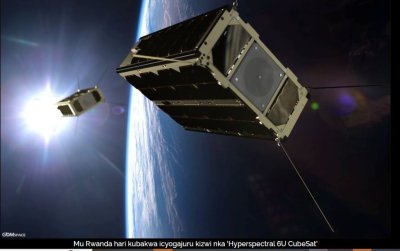Rwanda’s Hyperspectral 6U CubeSat: A New Era in Precision Agriculture
Rwanda is currently constructing a satellite known as the “Hyperspectral 6U CubeSat,” a unique satellite with advanced capabilities. Unlike traditional satellites that capture images in only three colors (RGB), this CubeSat will use sensors to capture images in all spectral bands, providing highly detailed data, especially beneficial in agriculture.
The satellite is being developed by TRL Space Rwanda, a company specializing in small satellites (CubeSats), which originated in the Czech Republic. TRL Space has been operating in Rwanda for the past three years and is based at Norrsken House Kigali.
Most of the engineers working on the project are Rwandans, trained by European experts. The satellite will weigh between 10 and 12 kilograms, with dimensions of 10 cm in height, 20 cm in width, and 30 cm in depth. Construction began this week, with a team of 20 engineers, including seven from Rwanda. The project is expected to be completed in 20 months, by June 2026.
Once finished, the satellite will be sent to the United States for launch into space, likely from the Kennedy Space Center or Cape Canaveral in Florida, using SpaceX’s Falcon 9 rocket.
This CubeSat, branded with Rwanda’s name, will orbit at 510 kilometers above Earth for five years. It will collect valuable data primarily for agriculture but could also benefit sectors like security and communication. The Rwanda Space Agency (RSA) is setting up a data collection center to process information sent by the satellite.
So far, $1 million (1.3 billion Rwandan Francs) has been invested in the project, and this figure is expected to rise.
Petr Kapoum, CEO of TRL Space Rwanda, revealed that after this launch, the goal is to send one Rwandan CubeSat to space each year, aiming for a total of five satellites. He emphasized that the launch of the first CubeSat would attract interest from various sectors, leading to commercial and non-commercial applications of the acquired knowledge and infrastructure.
U Rwanda rurikubaka icyogajuri kidasanzwe kizafasha mu buhinzi

